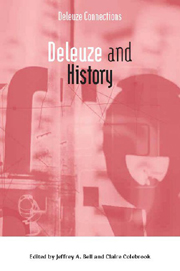Book contents
- Frontmatter
- Contents
- Introduction
- 1 Events, Becoming and History
- 2 Of the Rise and Progress of Philosophical Concepts: Deleuze's Humean Historiography
- 3 Theory of Delay in Balibar, Freud and Deleuze: Décalage, Nachträglichkeit, Retard
- 4 Geohistory and Hydro-Bio-Politics
- 5 The Thought of History in Benjamin and Deleuze
- 6 The Cannibal Within: White Men and the Embodiment of Evolutionary Time
- 7 Ageing, Perpetual Perishing and the Event as Pure Novelty: Péguy, Whitehead and Deleuze on Time and History
- 8 Cinema, Chronos/Cronos: Becoming an Accomplice to the Impasse of History
- 9 Deleuze's Untimely: Uses and Abuses in the Appropriation of Nietzsche
- 10 Is Anti-Oedipus a May '68 book?
- 11 Molar Entities and Molecular Populations in Human History
- Notes on Contributors
- Index
2 - Of the Rise and Progress of Philosophical Concepts: Deleuze's Humean Historiography
Published online by Cambridge University Press: 12 September 2012
- Frontmatter
- Contents
- Introduction
- 1 Events, Becoming and History
- 2 Of the Rise and Progress of Philosophical Concepts: Deleuze's Humean Historiography
- 3 Theory of Delay in Balibar, Freud and Deleuze: Décalage, Nachträglichkeit, Retard
- 4 Geohistory and Hydro-Bio-Politics
- 5 The Thought of History in Benjamin and Deleuze
- 6 The Cannibal Within: White Men and the Embodiment of Evolutionary Time
- 7 Ageing, Perpetual Perishing and the Event as Pure Novelty: Péguy, Whitehead and Deleuze on Time and History
- 8 Cinema, Chronos/Cronos: Becoming an Accomplice to the Impasse of History
- 9 Deleuze's Untimely: Uses and Abuses in the Appropriation of Nietzsche
- 10 Is Anti-Oedipus a May '68 book?
- 11 Molar Entities and Molecular Populations in Human History
- Notes on Contributors
- Index
Summary
In Deleuze and Guattari's A Thousand Plateaus, historical facts, dates and examples run throughout the text. From the use of dates as subtitles to each chapter, to the extensive use of historical examples, A Thousand Plateaus is brimming with history. And yet, as Deleuze and Guattari make clear, history is much more than an effort to represent the past as it actually happened. It is not just a matter of studying how one event causes another, how one actuality gives rise to another, but rather it ought also to entail a return to the conditions for the actualisation of the actual itself – conditions Deleuze will most frequently call the virtual. As Deleuze and Guattari put it in What is Philosophy?, to do such a history:
It would be necessary to go back up the path that science descends, and at the very end of which logic sets up its camp (the same goes for History, where we would have to arrive at the unhistorical vapour that goes beyond the actual factors to the advantage of a creation of something new). (Deleuze and Guattari 1994: 140, emphasis added)
A Deleuzo-Guattarian history, therefore, entails two readings. There is first the effort to read history as accurately as possible, and thus Deleuze and Guattari will frequently rely upon the works of highly respected historians such as Fernand Braudel. The second reading is what we will call problematising history.
- Type
- Chapter
- Information
- Deleuze and History , pp. 54 - 71Publisher: Edinburgh University PressPrint publication year: 2009

